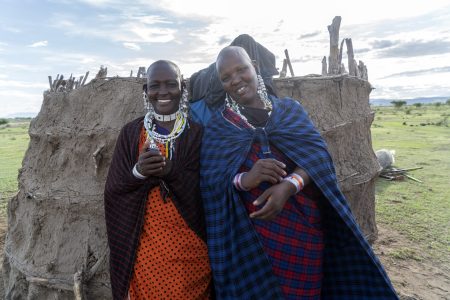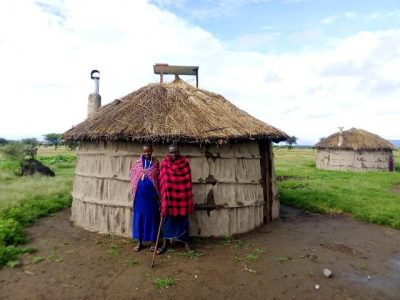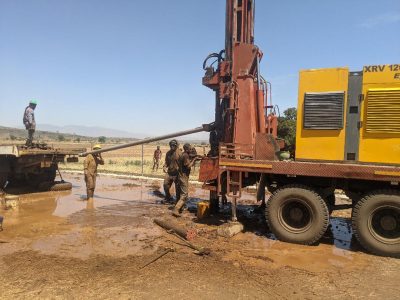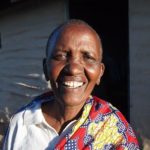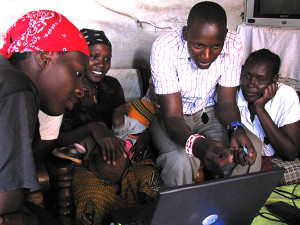The work of Maasai Stoves & Solar
The Maasai Stoves & Solar Project of the International Collaborative designs and installs smoke-removing and efficient wood-burning chimney stoves and solar panel-based electrical systems in the people’s homes. We also install settlement-wide solar panel-based micro-grid electrical systems for shared power. Water sanitation projects are also central to our mission.
Project locations
The Maasai Stoves & Solar Project started in Monduli district, Tanzania. We also work in Longido, Simajiro, and Ngorongoro districts. In Monduli district alone there are twenty thousand homes still to improve. With one million Maasai in Tanzania, the International Collaborative’s broad programs show the way forward for widespread improvement in the lives of the people.
Climate change adaptation
As part of our climate change adaptation mission , projects that demonstrate new livestock management and agriculture techniques are key. As climate changes, the people have to build on their local knowledge, outside ideas, and resources to overcome dependence on environmental conditions that are changing and out of their control.
Stoves

Woman cooking with the ICSEE stove
Are you aware of the danger of smoke in the homes of pastoral people in the developing world, caused by indoor cooking with open fires? This is a profound international health issue that affects millions.
In response, the Maasai Stoves & Solar Project designs and installs clean-burning and efficient wood-burning stoves, dramatically reducing indoor air pollution and wood fuel consumption. The stoves have a chimney and are insulated to eliminate burn danger.
These problems, arising from biomass burning for cooking, are especially severe for the Maasai of East Africa whose homes are small and poorly ventilated. The open cooking fires in the center of their tiny living spaces not only create indoor air pollution but also pose a serious threat for burns, especially for toddlers.
Maasai Women’s Installation Teams build the chimneys and install the stoves and solar systems. The Maasai Stoves & Solar Project manufactures the stove’s metal parts right in the area, stimulating the economy and empowering the people
Solar work and electrification

Electricians observed by an elder
In homes with the stove, clearing smoke and soot, the Project also installs photo-voltaic electrical systems. These are either as small, single home systems purchased by the householders with help from the International Collaborative in Arusha, or as a micro-grid serving an entire boma (Maasai family settlement).
The micro-grids are best, with good durability and excellent service to all buildings. With additional funds, a third option is also available. This a very high quality single-home solar system designed by the ICSEE, with long-term service and good power.
Responding to health challenges—water sanitation
Above all the International Collaborative’s stove program is aimed at improving health. It is also a conservation and convenience effort. Our other primary health-related program is water sanitation.

Unloading the tank for a new water sanitation system
Maasai women in the rural areas collect water daily from badly polluted surface ponds. Widespread illness and death follow from the use of bacteria-laden water. The International Collaborative designed a chlorination system that we construct right at the edge of the ponds. This way, women can collect clean, safe water each morning for their families.
With increased funding, this program can expand easily. The systems are inexpensive, with solar-powered pumps and convenient water access for the people.
Working for climate change adaptation in a rain-dependent society
Maasai economy is based primarily on livestock management and increasingly on farming. Both are rain-dependent when approached traditionally. Reducing their vulnerability to drought and weather uncertainty is essential, in light of climate change.
The International Collaborative holds informative workshops for Maasai herdsmen. These include demonstrations of alternatives to the basic rain-vulnerable practices of open range herding. We have a hay farm, a cow fodder manufacturing factory, and a cattle care feedlot. These are all demonstrations of the feasibility of taking good care of cattle in a more controlled and designed way. One can take part in production and delivery of food for livestock in ways that lessen weather vulnerability.
In the agricultural domain, the International Collaborative established a demonstration farm, or “Smart Farm,” with groundwater pumped via a solar system. We have developed flood, drip, and sprinkler irrigation. We work with neighboring farmers to explore ways to share water from deep bore holes. This includes uses of solar-powered small- scale pumping for getting water from shallow hand-dug wells for drip irrigation, to optimize the impact of the water.
Working with the Maasai men

Men, women, and stoves
Bringing light, eliminating indoor air pollution, and providing safe water are all essential to life. Maasai men control the family resources. It is important for the men to realize that these are all necessary for a better life for their wives, children, and themselves. They need to be supportive of women’s work and children’s progress.
The Project’s work with the men takes two forms. First, there is a focus on this understanding. The men need to generously allocate the resources necessary to achieve these aims.
The second form relates directly to the men’s livelihood as pastoralists and livestock keepers.
All Maasai families are finding a greater need for money to meet education, health, transport, and lodging expenses. With more utilization of livestock as entries to the money economy, as well a response to climate change, the traditional livestock and agricultural practices must change. Cattle must be harvested and grazed collectively to make grass-use planning possible. Herd sizes must be kept at manageable levels. Crops need alternative methods for irrigation.

